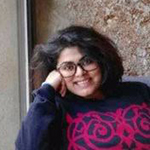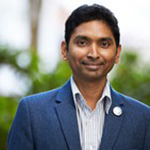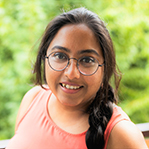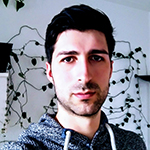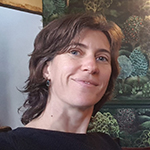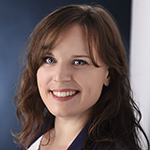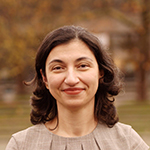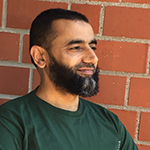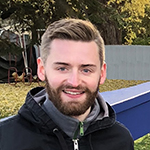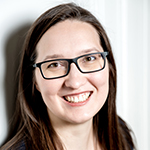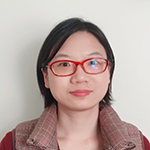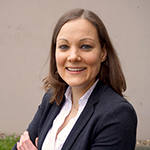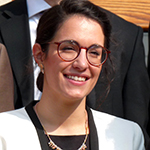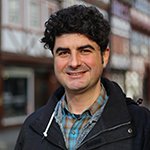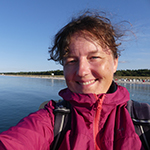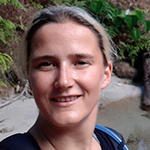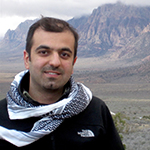Former Postdoc Committee Members
We are immensely grateful for the contributions from previous members of the Göttingen Campus Postdoc Committee who were generous enough to give up their time and energy to make the Göttingen Campus a better place for all researchers, wherever they work, whatever their background or discipline.
Many of our former Committee members are still in touch with the Network and continue to improve the experience of postdocs across the Göttingen Campus by attending events and sharing their ideas, expertise and vision.
Postdoc Committee alumni continue to enrich science and humanities by pursuing their goals, whether in Germany or around the world, in various roles such as publishing, management, teaching, industry, medicine, research, academia and much more.
Natalia Ruiz
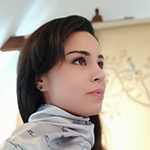
Natalia Ruiz is a postdoctoral fellow of the Alexander-von-Humboldt Foundation at the Institute of Agricultural Law of the University of Göttingen. She is a Colombian legal scholar and consultant on issues related to international development, gender equality, indigenous rights and environmental justice. She completed her PhD in Law from Colombia’s National University and educational and professional experience in South Korea, China and the United States. Her current research work, “An agrarian adjudication theory for small farmers and indigenous populations in Colombia”, focuses on aspects of rural reform in Colombia following the 2016 Peace Accord. Natalia loves bicycling with her family, progressive rock music, collecting shoes, gourmet food and travel.
Muhammad Salim Hakeemi
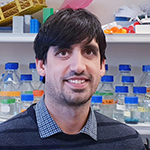
Muhammad received his PhD in 2018 from the Institute of Developmental Biology, University of Cologne. In October 2018, he joined the University of Göttingen, Department of Evolutionary Developmental Genetics as a postdoctoral researcher. His research focus is on development of transgenic tools for spatiotemporal control of RNA interference (RNAi) for gene function analysis. Muhammad found the Göttingen Campus Postdoc Network a great platform for postdoctoral researchers, not only to take part in their regular activities for information exchange but also to attend special events for career development.
Marthe Klöcking
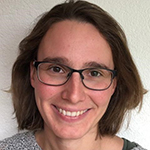
Marthe Klöcking is an observational geodynamicist and data scientist. She coordinates the Digital Geochemical Data Infrastructure (DIGIS) project that is modernising the geochemical database ‘GEOROC’: with the goal to maximise access to and re-use of research data collected over the past decades, and so to improve the research infrastructure in Germany and worldwide.
When she has time for research herself, Marthe exploits the chemical fingerprints of volcanic rocks to study the origin of magmas and the internal structure of continents in places such as Yellowstone. She holds a PhD from the University of Cambridge (UK) and has worked as a postdoctoral fellow at Macquarie University and the Australian National University (Australia). Marthe has experience attracting her own research funding and working with industry and government partners.
She loves the outdoors, especially while hiking, cycling or rowing. She enjoys challenging her perceptions and inherent biases through travel, culture and exchange with people from all backgrounds and stages of life.
Lisa Maria Franke

Dr. phil. Lisa Maria Franke is specialised in the fields of Arabic and Islamic Studies as well as in Social and Cultural Anthropology. Currently, she works as assistant professor in the field "Anthropology of Islam" at the Institue of Social and Cultural Anthropology, University of Göttingen. She carries out research on individual religiosities and non-conformist perspectives in Alexandria as part of the ERC project "Private Pieties: Mundane Islam and New Forms of Muslim Religiosity: Impact on Contemporary Social and Political Dynamics" (2016-2022). She received her PhD in Arabic Studies from the University of Leipzig in 2011. Here, she focussed on martyrdom, gender constructions and social discourses in Palestine. Subsequently, at the University of Cologne, she dealt with the religious, social and political content of colloquial poetry in Egypt and published on the symbolism in modern interpretations of the end times. Her research interests include everyday history, eschatology, belief and identity, discourse analysis, and gender studies; processes of individualisation, religious transformations and social dynamics; the use of language in various forms of texts. She graduated from the University of Bayreuth and the School of Oriental and African Studies (London). She taught at the Universities of Leipzig, Cologne and Goettingen as assistant professor.
Kibrom Sibhatu
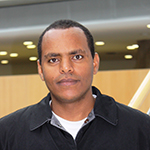
Kibrom Sibhatu, from Eritrea, is an Agricultural and Food Economist interested in the dynamic linkages of human welfare with ecosystem services in response to global challenges, including deforestation, poverty, food insecurity, hunger and malnutrition, and climate change. His research experience encompasses projects in the Global South, where he researched the link between farm-level agricultural biodiversity and the quality of diets in smallholder households.
His current research focuses on smallholder land-use change and human welfare in Southeast Asia, particularly in Sumatra, Indonesia. This work is under the EFForTS project - a Collaborative Research Center (CRC 990) funded by the German Research Foundation (DFG). The CRC 990 investigates the ecological and socioeconomic effects of the significant transformation of forests towards a cash crop-dominated rubber and oil palm plantation landscape, focusing on smallholder systems.
Outside work, he is a dedicated runner, plays football, and spends much time reading. He is also active in organizing events for and supporting refugees in Göttingen.
At the University of Göttingen (and other universities in Germany), foreign nationals are increasingly occupying vital (albeit short-term) early-career academic and research positions. However, international staff (and their partners) are often faced with distinct challenges, including language barriers, immigration status, and short-term work contracts. As a Göttingen Campus Postdoc Committee member, he is keen to help address such challenges in collaboration with other team members.
Constanza Tapia Contreras
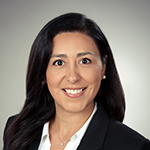
Constanza, originally from Chile, was awarded by the National Commission for Scientific and Technological Research (CONICYT) and the German Academic Exchange Service (DAAD). She obtained her Ph.D. from the Department of Developmental Biology of the Georg-August-University in 2021. Afterward, she joined the Department of General, Visceral and Pediatric Surgery as a postdoctoral fellow of the Dorothea Schlözer program at the University Medical Center, Göttingen. Her research focuses on Pancreatic ductal adenocarcinoma, using in-vitro models (patient-derived organoids) to facilitate pharmacological screening studies and identify novel therapeutic targets. In her spare time, she enjoys reading, cooking, doing sports, and dancing salsa.
Kamila Svobodova
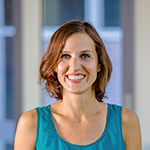
Kamila Svobodova is a Marie Skłodowska-Curie Research Fellow at the University of Göttingen. Through her project CESMINE, she explores the complexities of socio-economic rehabilitation after small-scale mining in Germany, Denmark, and the Czech Republic. She also holds an honorary role at the Centre for Social Responsibility at the University of Queensland. Her expertise is in understanding how important ‘environmental psychology’ is when designing mine closure and post-mining landscapes. Kamila is a Landscape Engineer and she holds a Ph.D. in Architecture and Urbanism. Besides her academic career, Kamila worked as an urban planner and participated in various regional development planning projects. She is an outdoor and travel enthusiast. During her time off, you usually find her hiking or climbing. She enjoys traveling, meeting new people, and exploring different cultures.
Ilka Vosteen
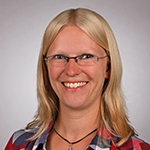
Ilka Vosteen is a behavioral ecologist who focuses on searching and orientation behavior of insects. She did her PhD at the Max Planck Institute for Chemical Ecology in Jena, followed by a three years postdoc project in the Laboratory of Entomology at Wageningen University (NL). In October 2019, she joined the Agricultural Entomology group at the University of Göttingen, where she explores how our knowledge on insect behavior can be applied to make pest control in agricultural systems more sustainable.
Ilka thinks that the postdoc phase is very challenging, because of short-term projects and the necessity to move between universities in different cities and countries to pursue an academic career. An active exchange with postdocs in similar situations can help scientists to deal with the challenges of this critical career phase and Ilka hopes to foster this exchange as an active member of the Postdoc Network. During her time off, Ilka enjoys hiking in the surroundings of Göttingen, gardening on her balcony, cooking delicious meals and reading.
Tobias Kahland
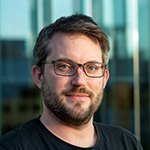
Tobias Kahland did his PhD research at the German Primate Center - Leibniz Institute for Primate Research (DPZ) and the Central Institute for Experimental Animals (CIEA) in Kawasaki, Japan, about transgenesis and gene modification in the common marmoset. After some time away from academia he is back working as a postdoctoral researcher at the Deutsches Primatenzentrum in the Platform Degenerative Diseases, focusing on Assisted Reproductive Technologies (ART) and genetic modification in the common marmoset.
Outside of work he likes to spend time at the sea for scuba diving or kite surfing and explore the outdoors while hiking or cycling.
Tobias Pöhnl
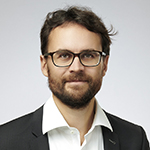
Tobias Pöhnl is a Food Technologist, currently working at the group of Quality and Sensory of Plant Products at the Agricultural Faculty of the University of Göttingen. He obtained his PhD at the University of Hohenheim (Stuttgart) in 2019. His academic interest is the technological and sensorial value of primary and secondary plant metabolites as well as their synthesis and accumulation in agricultural systems. The analysis and identification of those compounds by chromatographic methods demands most of his time. Currently bitter compounds in the context of sustainable production of tasty food for the future are of particular interest.
When he is not working you can find him outdoors running or cycling, maybe at a marathon nearby. Holidays are best spent hiking or mountaineering anywhere between Norway and the Austrian Alps. For relaxation, he enjoys good food, wine and movies or a board game with friends.
Dingsu Feng
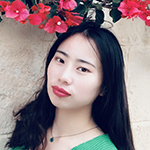
Dingsu Feng works as a Postdoc at the Geosciences Centre, geochemistry and isotope department of the University of Göttingen, hired by University of Cologne. Her research focuses mainly on the stable oxygen isotope analysis on PO4. She did her PhD at the University of Göttingen on the topic “Triple Oxygen Isotope analysis of Bioapatite”, namely the tooth enamel, which were used as a new proxy to reconstruct the Paleo CO2 concentration. Currently, she continues the PO4 research on soil and plants.
In her free time, she is either in the gym or playing badminton with her beloved ASC4 team players. In her holidays, she is always traveling overseas, meeting new people, getting to know different cultures and exploring the wonderful world.
Lizhen Chen
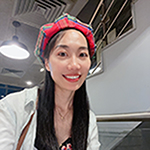
Lizhen Chen earned her Ph.D. from the Department of Chemistry at the University of Hamburg in 2022. Afterward, she commenced her early career as a Postdoctoral Researcher at the Department of Wood Technology and Wood-based Composites at the University of Göttingen in September 2022. Her primary research focuses on developing sustainable wood-based nanochannels for energy-harvesting devices. In addition, her research experience and interests include synthesizing hybrid materials designed for applications in biomimicking, hydrogen evolution reactions, and photoelectrochemical processes, as well as solid-state nanopores/nanochannels science and bio-sensing applications. Her academic journey has endowed her with a wealth of experience in lecturing and collaborating with international partners.
In her spare time, she enjoys reading and playing sports like badminton and table tennis, swimming, and dancing.
